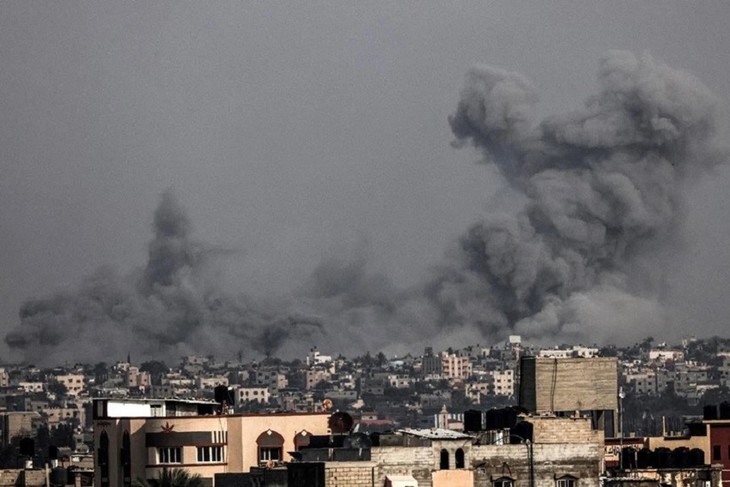(VOVWORLD) -The Hamas-Israel conflict is a geopolitical cataclysm overshadowing the Middle East this year. It’s the largest conflict of the past few decades between Israel and the Islamist movement Hamas, causing an enormous loss of lives on both sides and threatening to erode the fragile security environment of the Middle East.
 Smoke is seen in Khan Yunis, south of the Gaza Strip, after Israel's attacks, December 9, 2023 (Photo: AFP/VNA) Smoke is seen in Khan Yunis, south of the Gaza Strip, after Israel's attacks, December 9, 2023 (Photo: AFP/VNA) |
On October 7, Hamas suddenly launched a large-scale attack from the Gaza Strip into nearby Israeli residential areas and military barracks, killing many people and taking hundreds more hostage. In response, Israel launched its largest counterattack operation since 1973.
Fierce conflict and humanitarian crisis
More than two months later, the conflict shows no sign of ending. Data from the UN, the Gaza health authority, and Israel showed that, as of mid-December, some 20,000 people had died, including 18,500 Palestinians (both Hamas militants and civilians) and more than 1,400 Israeli civilians and soldiers, the heaviest losses on both sides since 1948.
Besides the loss of lives, the conflict has destroyed the entire infrastructure and economy of Gaza, home to 2.3 million people. Data from the UN Satellite Center (UNOSAT) in mid-December showed that 60% of the infrastructure in Gaza has been damaged, 20% completely destroyed, and 80% of Gaza's population, 1.8 million people, have been forced to flee their homes. Health, clean water, and food systems are all on the brink of collapse, while starvation and diseases threaten the lives of hundreds of thousands of people, many of them children.
Regional and global diplomatic efforts have been made in the last 2 months. The UN has held 10 emergency meetings and passed one resolution at the UN Security Council and one resolution at the UN General Assembly demanding a long-term ceasefire, more humanitarian aid, and a political solution.
However, despite calls from many sides, Israel and Hamas have only been able to agree on a 7-day pause (from November 24 to December 1) to exchange hostages and deliver humanitarian aid.
Middle East security at stake
The conflict in Gaza has heavily affected the regional economy and security. Diplomatic efforts to improve relations between Israel and Arab countries have been jeopardized. On October 14, Saudi Arabia announced the temporary suspension of a discussion on normalizing relations with Israel. Observers say that if the conflict in Gaza gets out of control and Palestinian civilian casualties become too great, even the historic Abraham Accords signed in September 2020 between Israel and the UAE and Bahrain could collapse.
The economic impacts of the conflict are growing. At the end of November, the Israeli Central Bank estimated that Israel’s economy had lost at least 53 billion USD and said that, if the conflict continues, that number will continue to rise.
Meanwhile, Gaza’s economy has collapsed. Increasingly frequent attacks on cargo ships in the Red Sea by Houthi forces in Yemen, under the pretext of disrupting shipping to and from Israel, are making a vital maritime route too hazardous for everyone.
Since mid-December, a number of the world's biggest shipping companies, including MAERSK, Hapag-Lloyd, CMA-CGM, Evergreen, and Euronav, have temporarily suspended travel through the Red Sea to avoid being attacked. This will have a strong impact on global trade. The Suez Canal-Red Sea route carries 50% of global container shipping.
Most of the international community believe that the conflict in Gaza can only be resolved by embracing a two-state solution.
Egyptian Foreign Minister Sameh Shoukry said: "We can no longer only address the two-state solution that the international community and the Security Council do have the necessary resources and means to implement what has become recognized as an international community consensus to the end of the conflict on the basis of two-state solution to live side by in peace and security."
Thanks to the efforts and restraint of parties, the conflict in Gaza is still limited geographically. But there is concern that if the conflict continues, the fragile security in the Middle East will be destroyed. The negative impact on the world will be great because the Middle East produces 35% of the world's oil and 14% of its gas.